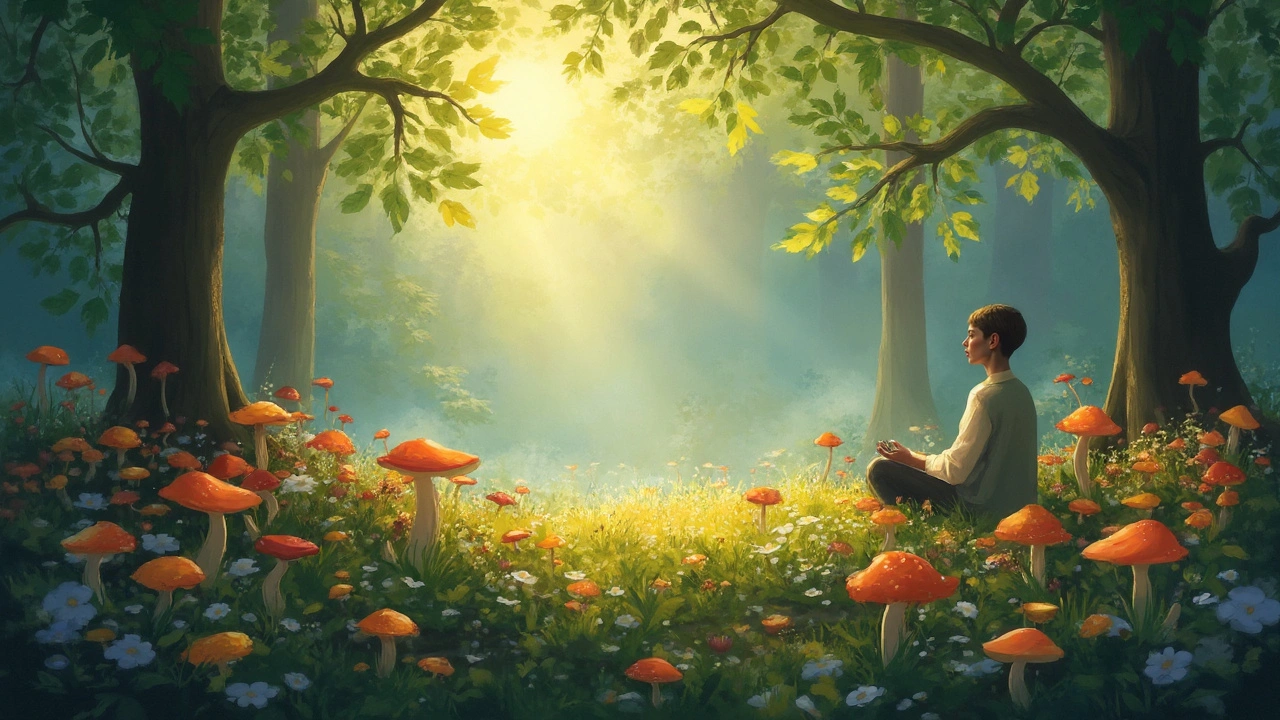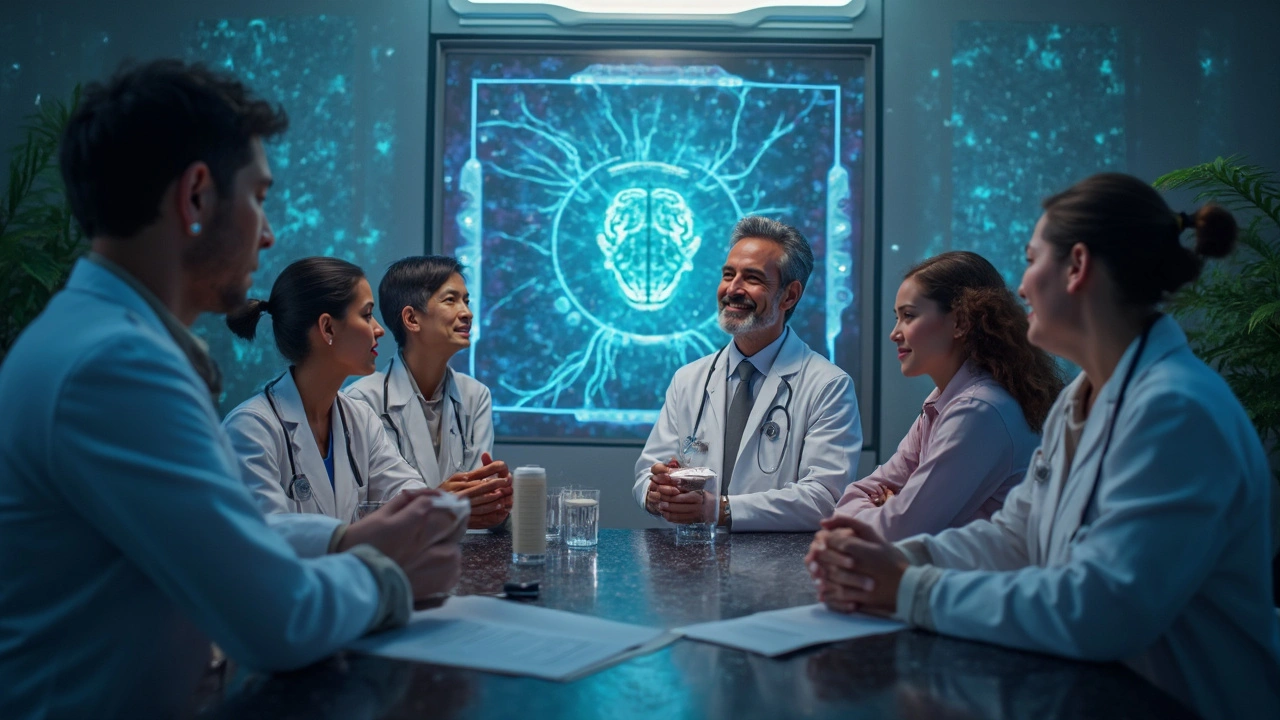
Psilocybin might sound like something out of a science fiction novel, but it’s very much a reality in the world of mental health therapy today. This compound, found in certain species of mushrooms, has been catching the attention of researchers due to its potential to treat conditions like depression and anxiety.
So, what's the real deal with psilocybin? Basically, it's a psychedelic that's known for altering perceptions and mood. While that might sound a bit intense, don't dismiss it just yet. Studies have shown that in controlled environments, psilocybin can bring about significant improvements in mental health, particularly for people who aren't responding to traditional treatments.
For many, the idea of using a psychedelic for therapy brings up a ton of questions and a fair bit of skepticism. What sets psilocybin apart, though, is its ability to create new neural pathways. In simpler terms, it can help 'reset' the brain patterns that often lead to negative thought loops, which is a big deal for those battling tough mental health issues.
When we think of powerful medicines, fungi aren't usually the first thing that comes to mind. Yet, hiding within certain species of mushrooms is psilocybin, a compound that's been gaining attention not just for its psychedelic effects, but more importantly, for its potential to help with various mental health conditions.
Psilocybin is found in over 180 species of mushrooms, commonly referred to as 'magic mushrooms.' These fungi have a long history of use in spiritual and religious ceremonies, dating back thousands of years. But today, the focus has shifted toward modern medical applications.
So what makes psilocybin so special? Once ingested, the body converts it into psilocin, which influences serotonin receptors in the brain. This has the effect of altering mood and perception, providing new insights and pathways for thought processes. But don't let its mind-bending reputation deter you—research shows that these changes can be incredibly therapeutic under the right conditions.
| Year | Studies | Outcome |
|---|---|---|
| 2018 | Johns Hopkins University Clinical Trial | Significant reduction in depression symptoms |
| 2020 | Imperial College London Research | Increased connectivity between brain regions |
For instance, a clinical study carried out in 2018 at Johns Hopkins University demonstrated a significant reduction in depression symptoms following psilocybin sessions. These findings are mirrored in other studies, like those from Imperial College London in 2020, which noted increased brain connectivity.
While it's exciting to see such promising results, it's important to approach psilocybin use with caution. It's still illegal in many parts of the world, though places like Oregon in the United States are pioneering the way toward legal therapeutic use. The future may hold wider acceptance as more research reinforces psilocybin's therapeutic potential.
As interest grows, it's crucial to continue exploring this compound's role within a controlled, clinical setting. With ongoing research and shifting perspectives, psilocybin just might transform from a mysterious agent of the past into a revolutionary tool for the future of mental health treatment.
Psilocybin, found in certain mushrooms, has a pretty interesting way of working with the brain. Once ingested, the body converts it into psilocin, which interacts with serotonin receptors. This is pretty important because serotonin is the chemical that affects mood, happiness, and even anxiety.
One of the standout things psilocybin does is alter how different parts of the brain communicate. Normally, our brain has set pathways for how information flows, which can be a problem if those pathways get stuck in patterns linked to depression or anxiety. Psilocybin can disrupt these patterns, encouraging different areas to start 'talking' to each other differently.
There's this part of the brain called the default mode network (DMN) that often gets a lot of attention. In people dealing with conditions like depression, the DMN is usually really active. Under psilocybin, the activity in the DMN decreases, which can help lower symptoms by reducing fixed negative thought patterns.
Imagine being able to hit reset on your brain, even just a little bit. That’s what psilocybin offers — a chance to break free from repetitive negative thoughts. Research, like a trial done at Johns Hopkins University, has shown promising results, with improved mood and emotional outlook among participants.
This isn't a magic cure-all but understanding how psilocybin interacts with the brain is opening doors to new treatment possibilities. As further studies roll out, the neuroscience behind it gets more compelling, offering hope for people not helped by conventional therapies.

Breaking into the mental health scene, psilocybin is showing impressive results in treating several mental disorders, shaking up how we think about therapy. Many folks with conditions like depression and PTSD, who've felt stuck with traditional treatments, are finding hope in this mushroom-derived compound.
Depression's a tough nut to crack, common treatments work for some but not all. Enter psilocybin. Research is showing that it can lift the cloud for those whose depression doesn't budge with regular meds. It's believed to boost mood by changing brain connections, helping folks see the world with a fresh perspective.
Anxiety can feel like a never-ending cycle of worry. Those dealing with chronic anxiety disorders might get relief from psilocybin, which appears to reduce the nervousness and fear that come with anxiety. It’s like hitting a mental 'pause' button, allowing people to breathe easier.
For those haunted by traumatic memories, psilocybin might offer a chance for peace. Studies suggest that psilocybin-assisted therapy helps patients face and process trauma, leading to fewer flashbacks and panic episodes. It’s still early days, but the outcomes are promising.
Breaking free from addictions often feels like a losing battle, but psilocybin might be changing the game. Research indicates that it can help reset how the brain thinks about cravings and habits. It’s like giving your mind a reboot, helping some kick habits they thought they'd live with forever.
All this buzz around psilocybin is backed by credible studies. For instance, a 2022 study showed a significant drop in depression symptoms for weeks post-treatment. It’s important to remember that although these findings are exciting, psilocybin therapy should only be done under professional guidance.
Diving into the world of psilocybin therapy, it's crucial to balance the excitement with a good dose of caution. The therapeutic potential of this compound is no doubt fascinating, but understanding the safety nets and ethical boundaries is equally important.
First things first, psilocybin treatment isn't about popping a mushroom and hoping for the best. It's all about controlled use with trained professionals. Ensuring the environment is safe and supportive makes a huge difference in the outcome of the therapy. In clinical trials, participants are carefully monitored throughout their experience, providing assurance and safety.
Here's the kicker: while some places are opening up to psilocybin, it's not a free-for-all. The legal status varies widely across the globe. For instance, it's legal in a therapeutic setting in Oregon, but elsewhere it might still be under strict control. Knowing the legal landscape is essential for anyone considering this avenue.
Ethics in psilocybin therapy can't be overstated. Ensuring the research is conducted ethically is vital, including obtaining informed consent from participants. Transparency around what the treatment involves, as well as potential risks, is key to maintaining trust and integrity in the field.
Even with promising benefits, it's important to be aware of the potential risks. Some people might experience unsettling thoughts or emotions during their sessions. This is why professional guidance is so critical. Keeping the experience positive and productive often hinges on having the right support network in place.
The journey of integrating psilocybin into mainstream therapy is ongoing. With more states and countries reconsidering their stance, the conversation is evolving. Safety and ethical considerations will always play a critical role in ensuring psilocybin is used responsibly and effectively.

Psilocybin therapy is making waves, but what does the future hold? Well, there’s a lot of excitement around its potential, as it could change the way we approach mental health treatments. Currently, numerous clinical trials are ongoing across the globe, testing psilocybin for everything from depression to end-of-life anxiety in patients with terminal illnesses.
One of the biggest hurdles for psilocybin therapy is the whole legal bit. In some places like Oregon in the U.S., there’ve been moves to legalize its therapeutic use. However, we're not quite there yet in many regions. It’s a slow march toward acceptance, filled with policy reviews and debate.
If things go well, psilocybin could become a part of mainstream medicine. The aim is to have trained professionals guide patients through sessions, ensuring safety and maximizing benefits. Institutions like Johns Hopkins are leading the way, providing frameworks for how these sessions can be effectively structured.
There's a ton of investment in this field right now. Companies are pouring resources into developing psilocybin-based therapies, similar to how cannabis was once explored. Initial studies suggest that psilocybin could lead to positive outcomes in treating PTSD, obsessive-compulsive disorder, and even addiction.
As further studies are published, they could provide the evidence needed to shift more public opinion and influence lawmakers. With mental health issues on the rise globally, the demand for effective treatments is urgent.
One thing’s for sure: whether it’s a complete breakthrough or a cautious addition, psilocybin is not something researchers are giving up on anytime soon.
I've been watching the hype around psilocybin like a quiet observer, feeling the weight of each new study settle like fog in a room. The idea of resetting brain pathways sounds hopeful, yet the silence it leaves behind can be... unsettling. I wonder if the quiet after the trip might amplify the very thoughts we try to erase.
Maybe the real therapy is learning to sit with that silence, not just chase the high.
People need to stop glorifying drug‑induced mind‑games and face reality that messing with brain chemistry is a moral gamble.
Data shows a statistically significant drop in PHQ‑9 scores after controlled dosing; correlation does not equal causation.
Wow, the psychedelic renaissance feels like watching a sunrise after a century of mental‑health darkness. The way psilocybin nudges the default mode network into a gentle dance of connectivity is nothing short of poetic. It’s as if the brain finally gets to hear a new song, one it thought it had forgotten. This could be the brushstroke we needed on the canvas of modern therapy, painting hope where there was only gray before.
Let’s keep the conversation flowing, because every perspective adds a hue to this evolving masterpiece.
Brent, I hear your anger and I can’t help but think there’s a deeper story behind the rush to label psilocybin as a “drug‑induced mind‑game.” For decades, powerful interests have kept certain therapeutics under wraps, not because they’re dangerous, but because they threaten existing profit models. The same agencies that once demonized cannabis are now whispering about psychedelic therapies, a flip that feels less like progress and more like a calculated pivot. Have you ever considered that the sudden surge in research funding coincides neatly with the decline of pharmaceutical giants’ patents on antidepressants?
Remember the old “War on Drugs” narrative? It was a tool, not a moral crusade. In the shadows, there are lobbyists who see psilocybin as a way to reboot the public’s trust in “alternative” medicine, paving the way for lucrative private clinics that could charge fortunes for a single session.
Moreover, the media’s glorification of “resetting the brain” taps into a cultural appetite for quick fixes, a trend cultivated by advertising agencies for years. While I’m not saying every trial is a scam, the pattern suggests a coordinated effort to redirect attention and money. The fact that legal frameworks are being reshaped at lightning speed-think of Oregon’s Measure 109-raises eyebrows about who’s truly benefiting.
We must stay vigilant, question the motives, and demand transparency, otherwise we risk swapping one form of control for another. The chemistry is fascinating, but the politics are even more intoxicating. So before we celebrate the “therapeutic potential,” let’s examine who writes the prescription and who reaps the reward.
If you’re curious about trying psilocybin, the best first step is to find a certified clinical trial or a licensed therapist in a jurisdiction where it’s legal. Many programs offer thorough screening, preparatory sessions, and integration counseling after the experience, which maximizes safety and therapeutic benefit.
Starting with a low dose under professional supervision can help you gauge how your mind responds before considering higher doses.
Oh my gosh!!! Can you even imagine the sheer magnitude of a mushroom‑derived compound literally rewiring our thoughts??? It’s like the universe decided to hand us a cosmic cheat‑code for happiness!!! But wait-there’s a catch!!! Safety protocols must be ironclad, because diving into altered consciousness without a qualified guide is a recipe for disaster!!! So, yes-embrace the hope, but never skip the groundwork!!!
One must admit, the notion of a fungal metabolite functioning as a catalyst for psychological renaissance is rather intoxicating, albeit tinged with a hint of theatrical grandeur. It evokes the image of a sophisticated symphony where serotonin receptors are the elite musicians, and psilocybin conducts them toward a crescendo of insight. While the science is still composing its full score, the overture is undeniably compelling. Let us, therefore, attend this concert with both curiosity and a discerning palate.
Sounds like a promising avenue 🌱. If you’re considering it, make sure it’s in a legit setting and have a solid support crew afterwards. 👍🏽
There’s something genuinely exciting about the way psilocybin seems to dissolve the rigid walls of entrenched neural loops. It’s not a miracle cure, but a tool that-when paired with psychotherapy-might give patients a chance to rewrite the narrative they've been stuck in. As researchers keep fine‑tuning dosing protocols and integration techniques, I think we’ll see a clearer picture of who truly benefits and how to minimize risks.
Look the facts are simple psilocybin works in controlled settings just like other meds we trust it should be broader accessible now especially for those not helped by traditional drugs